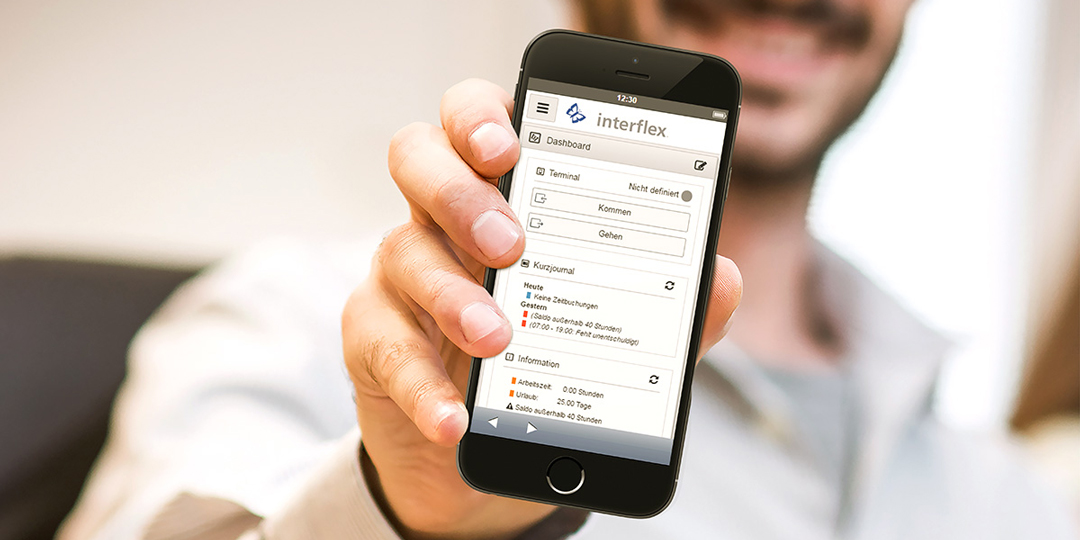ECJ Ruling on Time Tracking – Burden or Opportunity?
Since the European Court of Justice ruling mandating systematic time tracking, companies have been evaluating their options for the future. Will this lead to major investments that burden especially small and medium-sized businesses with even more bureaucracy?

Is additional staff now needed to meet the legal requirements for time tracking? How can companies whose employees work remotely or across multiple locations comply with the new regulations?
Employees are also wondering whether flexible arrangements like flextime, remote work, and trust-based working hours will be replaced by rigid schedules and punch clocks. This could have uncomfortable consequences, especially for families who rely on flexibility. Fortunately, companies like Interflex offer tailored solutions to turn this challenge into an opportunity.
According to the ECJ ruling from May 14, 2019, employers in the EU are now required to systematically record their employees’ working hours. However, the ruling does not specify how or where this tracking must take place - that responsibility lies with national legislators. This means that existing working time models do not necessarily need to change, as long as they allow for proper time tracking. They must simply comply with current labor laws and regulations, including required breaks and rest periods.
On closer inspection, the new regulation offers clear advantages for employers. With complete time tracking, they gain a reliable data foundation for each employee’s working hours, allowing better analysis of effort spent on tasks or projects and more precise workforce planning. Employees benefit from a clear overview of their time accounts. They can check their overtime at any time, which can be considered according to their employment contracts. Vacation bookings and remaining leave are also clearly documented, a win for both employers and employees, as it eliminates the need for follow-up with HR.
Advantages of Modern Systems
Flexible working time models remain valid under the new legal framework. Companies and employees can continue to shape their work lives according to business needs and personal or family priorities. It’s worth noting that even before the ruling, some employment types already required time tracking, for example, shift work, mini-jobs, professional drivers, and public sector roles. In these areas, the new legislation may prompt a review of existing systems to determine whether they offer all the technological advantages available today or need to be replaced.
This raises the question for all European companies: what can a modern time tracking system actually do? In today’s increasingly flexible work environment, employers need highly adaptable systems that support various working time models and allow mobile time bookings, for example, for field appointments or remote work days. Depending on the company’s needs, modern systems offer mobile booking options and features that allow working hours to be assigned to specific projects, tasks, or cost centers.
Features like employee self-service, intuitive dashboards and workflows, and robust reporting tools make time tracking a versatile tool that also benefits management. HR planners gain a data foundation to reduce overtime and premium hours, helping to lower personnel costs. Employees benefit from improved planning and transparency.
Booking from Multiple Locations
To ensure reliable time tracking across all job types and work environments, systems from Interflex Datensysteme GmbH support mobile time bookings from any location, including business trips, vacation requests, and a clear view of personal time accounts. Integration with access control systems is also possible. Mobile features like decentralized bookings via tablet or smartphone, or access permissions via smartphone, offer modern flexibility.
Making Informed Decisions
The ECJ ruling has not yet been fully implemented into national legislation across EU member states. However, new laws are expected soon, so companies should already begin planning their investments wisely. It’s important to choose a time tracking system that is future-proof and delivers real value for the business. Scalable systems that can grow with the company offer greater flexibility and investment security.
Interflex Datensysteme GmbH provides tailored consulting to help companies plan their time tracking systems so that the chosen solution fully leverages the benefits for both employers and employees. Interflex solutions are highly adaptable. Companies that prefer not to manage their systems internally can opt for Interflex Managed Services. In this model, employees, managers, and HR departments use the time tracking system as usual, while Interflex handles all technical support for the software and infrastructure.